N.L. Brisson's Blog, page 3
October 26, 2024
Jackson Brodie Mysteries by Kate Atkinson
 Version 1.0.0
Version 1.0.0From a Google Image Search – Kenyan Library – not all these books are in the series and not all the titles in the series are present
It is Kate Atkinson’s fault that I haven’t been able to do my housework. It’s her fault that my sleep schedule has been upended. I’m not resentful. Bingeing on a great series of books can be just as satisfying as bingeing on those made-for-TV series. More even. Kate Atkinson has written a series of six mystery books featuring the semi-enlightened, always striving for full enlightenment, Jackson Brodie. Her plots are unique and offer some interesting variety. Brodie’s personal friends and family members stay with us throughout the series once they make an appearance. The thread that holds the series together is Atkinson’s passion to raise awareness of the vulnerability of girls and woman in a world where many men embrace male dominance or outright exploitation of women.
The women in this series are shot, stabbed, beaten, kidnapped, and used. There are also strong women who may have once been downtrodden but will no longer tolerate abuse. Jackson Brodie often falls in love with these women and occasionally marries them. Don’t be frustrated if it takes a while for Brodie to appear. All the threads come together in astonishing and very satisfying ways, except for when Jackson thinks he might have stumbled upon the best relationship of all.
In order, Atkinson offers us 1. Case histories, 2. One Good Turn, 3. When Will There Be Good News, 4. Started Early Took My Dog, 5. Big Sky, 6. Death at the Sign of the Rook.
Case Histories: Victor meets Rosemary – “Women seemed to him to be in possession of all kinds of undesirable properties, chiefly madness, but also a multiplicity of physical drawbacks–blood, sex, children–which were unsettling and other. Yet something in him yearned to be surrounded by the kind of activity and warmth so missing in his own childhood, which was how, before he even knew what had happened, like opening the door to the wrong room, he was taking tea in a cottage in rural Norfolk while Rosemary shyly displayed a (rather cheap) diamond-chip engagement ring to her parents.” (p. 23) You can probably guess that this doesn’t end well.
One Good Turn: An incident of road rage involving a timid mystery author escalates due to mistaken identity to reveal a Russian sex trafficking ring hiding behind a maid service. Jackson is married to Julia, an actress he met under sad circumstances, although Julia doesn’t do sad. Atkinson gets to have fun giving us the fantasies of our sensitive mystery author. Jackson is in Scotland with Julia, so he is having a tough time navigating his way through the arts festival that is making for crowds everywhere. As he explores one tourist site, he comes across a beautiful dead woman who drowned but when he tries to pull her back to land, she disappears. He reports the incident, but the police have a hard time believing him. Chaos ensues and Jackson ends up bruised, battered, briefly jailed, and almost killed.
When Will There Be Good News: Gabrielle, Joanna, younger daughter Jessica, and baby Joseph are violently attacked while walking home along a country lane. Joanna is the only survivor. We meet Joanna again, all grown up, now Dr. Hunter, with a feckless husband and child of her own. Reggie (Regina) Chase is Dr. Hunter’s mother’s helper and babysitter. When Dr. Hunter and her baby are kidnapped, it is Jackson Brodie to the rescue.
Started Early Took My Dog: Clearly the Jackson Brodie mysteries are not happening in America. We are in Great Britain in this series of books. What happens to women in America is just as bad though. This we know. Jackson is in Leeds now but we, the reader, are briefly in 1975. We meet Tracy Waterhouse of the police force. Years later, near retirement, on impulse Tracy pays a wayward mom, probably a hooker, and probably on drugs to sell her the child the mom is dragging through the mall, berating the child as they go. Back at the beginning of her career (in 1975) she talks to her partner. “Tracy Waterhouse pressed her thumb on the doorbell and kept it there. Glanced down at her ugly police-issue regulation black lace-ups and wriggled her toes inside her ugly police-issue regulation black tights. Her big toe had gone right through the hole in the tights now and a ladder was climbing up toward one of her big footballer’s knees. ‘It’ll be some old bloke who’s been lying here for weeks,’ she said. “I bloody hate them.”
“I hate train jumpers.”
“Dead kiddies.”
“Yeah. They’re the worst,” Arkwright agreed. Dead children were trumps, every time.” (p.5)
It will be a long time and many side trips before Jackson catches up with Tracy Waterhouse.
Big Sky: Jackson is renting a place by the sea, but as they say, death takes no holidays. Jackson learned he had fathered a son with Julia, who tried to hide the child’s paternity. Nathan, the son, is staying with his dad, Jackson, but he is a teenager and not a happy one. We have crooked cops and ex-cops, money laundering, comics and drag queens. Eventually we have Reggie Chase and Jackson working reluctantly together to solve the mystery of a woman killed by a golf club. The crooked cops are all members of an elite golf club, and they are acting dodgy. The sky may be big and the view beautiful, but humans (especially men) are still up to no good.
Death at the Sign of the Rook: This mystery proceeds like a classic Agatha Christie mystery with all the possible murderers trapped together in a nearly bankrupt estate where they are holding a murder mystery weekend during an unexpected raging snowstorm. What brutal body injuries will Jackson suffer this time. What horrific things will or won’t happen to the women in the story.
You should read these, but just remember they are almost impossible to put down once you start. Kate Atkinson’s point about the vulnerability of women and girls is a good reminder that regardless of how accomplished and powerful women get they still need to take care. She reminds us that we need to work on creating societies where women are not victims.
September 23, 2024
Autocracy, Inc. by Anne Applebaum, Ch. 4, Changing the Operating System/Hegemony
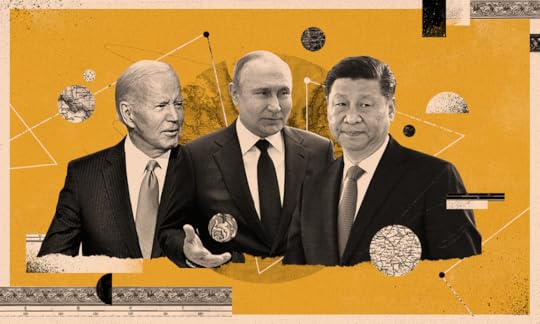
From a Google Image Search – What’s so bad about multipolarity? – Al Majalla
When we look at politics in America at this moment, poised as we are to go to the polls to elect a new president, and when we realize that one candidate wants to change America’s operating system while the other candidate will stay within the parameters our founder’s and previous administrations have designed for us, we can’t help looking ahead and imagining what American governance will be like in the future. The world seems to be slowly converting to autocratic governments run by dictators who pay loyalists by turning them into oligarchs to ensure their continued loyalty. These oligarchs steal money from citizens, stashing it away in tax shelters or secret bank accounts allowing kleptocracy to exist together with autocracy. How grim life becomes for people who are not part of these governments depends on the temperament and ideology of the “dear leader.”
Autocracy is not as shocking in a country that has never been a democracy, which perhaps evolved from a monarchy to a communist government and then to a dictatorship. But it is shocking to hear autocratic echoes in America which has always been a democracy since it won the right to be a sovereign nation rather than a colony. (We could take a moment to bemoan our imperialism, but it won’t help us in this instance.)
“Sovereign” is a key term that autocrats like to use, Anne Applebaum tells us in Chapter 4 of her book, Autocracy, Inc. As in, we are a “sovereign” nation. Keep your laws out of our country. Mind your own government. Your human rights are not necessarily our human rights.
In a review of Timothy Snyder’s new book, On Freedom, in the New York Times, the reviewer reminds us that
“On Nov. 9 it will be 35 years since the Berlin Wall fell. The exhilaration of that moment was followed by high hopes for the spread of democracy throughout Eastern Europe, then in Russia itself when the Soviet Union imploded. Gradually hope gave way to frustration, disappointment and then dismay. Russia did not become a liberal democracy, and nor did a number of its former satrapies.”
Sovereignty means keep your mitts off my country, hegemony means my country belongs at the top of the heap because it has the strongest economy, government, and military. If America held the hegemony in the twentieth century, other nations, autocratic nations, are competing for hegemony in the twenty-first century and beyond. We didn’t necessarily need Anne Applebaum to tell us this. As humans, we understand human nature. Competition seems hardwired in humans and all living things. What Anne Applebaum is telling us is that autocrats might be uniting to woo underdeveloped countries with aid and support for their autocratic leaders to create a world-wide-web of autocratic nations for the strength in numbers that might shift hegemony from America and the West to China and/or Russia.
Where once (after WWII) human rights became a goal of the nations that beat the Nazis and did not end up behind the “Iron Curtain” of Stalin’s Russia, all bets are now off. Where once nations declared that “recognition of the inherent dignity and of the equal and inalienable rights of all members of the human family is the foundation of freedom, justice and peace in the world. It is also acknowledged that ‘disregard and contempt for human rights have resulted in barbarous acts which have outraged the conscience of mankind.’…everyone has the right to life, liberty, and security of person. Applebaum continues to remind us of what was said in the shadow of Nazi genocide, “No one should be subjected to arbitrary arrest, detention, or exile. Torture and slavery should be banned.” (p. 99)
Applebaum speaks of what has been collectively known as “the rules-based order. She goes on to say that how the world ought to work is not how it actually works, that many signatories have violated these rules, but that (for now) they still influence behavior in the real world.”(p. 100)
She warns us that powerful autocracies like China or Russia want to get rid of the language of these old agreements. Xi Jinping said this while addressing the Communist Party in 2017, “China seeks to take an active part in leading reform of the global governance system.” She tells us the remarks of Andrea Worden, a legal scholar and China expert, “For the CCP to attain the moral legitimacy, respect, and recognition it needs for leadership of a new world order, it must remove the threat of Western universal human rights.” (p.101)
She tells us what Putin has to say about sovereignty. “Sovereignty includes the right to abuse citizens at home and to invade others abroad. This privilege is available to only a very few large nations. There are not many countries in the world that have sovereignty.” (p.102)
Another term that is popular with autocrats right now according to Applebaum is the term “multipolarity” because it telegraphs an organization of autocratic states, banded together for greater power, stronger economics, and hegemony. Of course, hegemony is not up for grabs. As in Putin’s view on sovereignty, hegemony belongs to very few nations, or perhaps only one and that would be whatever country wins the hegemony competition, takes hegemony away from the US.
What does this have to do with America? A lot. We have an autocrat running to be our president right now and he has a passionate cult following. You might also want to read this article from today’s New York Times about what liberals may not realize about MAGAs.
If you are paying any attention to politics, then you must have heard that this is an existential election. Donald Trump is not only not a Democrat, but he also doesn’t put much stock in democracy. He likes strong men and sees himself as one of these alpha males. He wants to head America and go steady with other autocrats. He may even think that his presence alone will ensure America’s hegemony among autocratic nations.
Perhaps inciting your followers to violence is something strong leaders do, but Trump doesn’t like to take responsibility for the violence he incites. Other autocrats have no difficulty showing that they don’t just intimidate, they act (although often they still delegate violent actions to others). Donald Trump believes that by changing the rules he can change our minds. He believes his propaganda is more effective than 240 years of living in a democracy. Americans have no experience living in an autocratic state. Even if he wins one, it might be hard to keep it. How will it feel if he actually sends troops out to round up immigrants (both legal and illegal) and spends our tax dollars to deport them or puts them in “camps” which are nothing like sports camps or computer camps but more like the Japanese Internment camps.
China, Applebaum says, wants to change the language, to throw out “political rights” or “human rights” and replace it with squishy language like “win-win cooperation” and “mutual respect.” (pp. 102-3)”
When I read the book To Paradise by Hana Yanagihara (which was not an easy book because of the way it skipped around in place and time while focusing on one family and its descendants) the book offered glimpses of an America under the thumb of the Chinese government (the UK was still a free nation). The America she depicts bears little resemblance to our beloved democracy/republic. Applebaum’s careful discussion and her evidence for a future united autocratic institution (the anti-UN) is a warning that we are in danger of losing our access to whatever human rights we still treasure and that many nations around the world will rejoice if we choose autocracy, if we replace “the rule of law” with “rule by law” (or whatever the leader says).
“A world in which autocracies work together to stay in power, work together to promote their system, and work together to damage democracies is not some distant dystopia. That world is the one we are living in right now,” says Anne Applebaum. (p. 121)
September 18, 2024
Autocracy, Inc. by Anne Applebaum, Ch. 3, National Security and Government Control

From a Google Image Search – Politico
Anne Applebaum’s book has a subtitle, The Dictators Who Want to Run the World. From her perch in Poland, she has a nearer view of all the players, Russia, China, Syria, Iran, and Africa. Nations that are run by autocrats are using new technologies not only to spy on other countries (especially democracies) but also to spy on their own citizens. You might argue that nations need to know what their enemies, both foreign and domestic, are up to but there are more sinister motives at work here too. Chapter 3 in Autocracy, Inc. has the title, “Controlling the Narrative”.
The author begins by reminding Americans that our NSA is collecting data about US citizens as we were informed by Edward Snowden, a whistleblower or traitor, depending on your point of view, who is living as an exile in Russia. She also mentions Pegasus spyware in Poland which was eventually exposed and investigated.
“If no parallel scandal has ever unfolded in China, Russia, Iran, or North Korea, that’s because there are no legislative committees or free media that could play the same role.” (p. 71)
Applebaum reasons that when democracies use spyware it helps autocracies justify their abuse. If there are fewer objections to using spyware outside of China, then there will be fewer objections to using it inside of China.
In fact, we all expect that surveillance inside nations, even democracies, will escalate as new tech advances are developed. Why develop spyware if you won’t use it. Americans objected to the intrusions of the Patriot Act after the attacks on 9/11 but were so shaken by these brazen attacks on America that we accepted these rules while also believing that they would be temporary. They have been replaced by the USA Freedom Act which curtailed the government’s authority to collect data in 2015. Democrats in Congress strongly objected whenever Trump wanted to collect names of people in a group he wanted to target.
In China, objections can be deadly, as in Tiananmen Square in 1989. China, says Applebaum, first tried to eliminate the activists (people), then set out to eliminate the ideas such as the rule of law, the separation of powers, the right to free speech and the right to assemble which are described as “spiritual pollution”. (p. 66)
While Americans still believe, or say they believe that the internet would lead to a cultural renaissance, Applebaum predicted in 2012 that the internet would become a tool of control. China was designing “the Great Firewall of China” (p. 67) which used an “elaborate system of blocks and filters to prevent users from seeing particular words and tools. She tells us that foreign companies rushed into the new security market in the same way companies had rushed into the post-Soviet financial market. (Yahoo, Microsoft, Cisco Systems all made software that complied with China’s rules.) These companies were eased out once China had access to their software. (p. 68)
The security network was expanded by combining online tracking with tools of repression such as security cameras, police inspections and arrest. Other tools might include “nanny apps” on phones, monitoring book purchases, picking up on unusual behaviors, voice recognition, and even DNA swabs. All these tools have been used on the Uighur population in China. Now add in facial recognition and AI and you have a state that can truly control the narrative.
Anne Applebaum did not just write her book to expose state surveillance tactics. Perhaps she felt we needed to understand what might be coming to a place near you. These systems can be copied and have been copied by many nations including Pakistan, Brazil, Mexico, Serbia, South Africa and Turkey.
“The more China can bring other countries’ models of grievance into line with China’s own,” argues Steven Feldstein, an expert in digital technology, “the less these countries pose a threat to Chinese hegemony.” (Am I nervous about writing these words without a powerful husband such as Applebaum’s to make her a public figure and hard to attack – yes, I am sometimes paranoid.)
Russia plays a different game says Applebaum. Lie constantly and blatantly and when exposed offer no counterarguments. (p. 78) Blame everyone but yourself. This “fire hose of falsehoods” makes citizens question how you can possibly know what really happened and so they avoid politics altogether. Autocrats spread hopelessness and cynicism because it works to their advantage. This is not Russia’s only game. Russia is also a surveillance state.
Surveillance was a thing we worried about in the post-WWII world. We had all read Orwell’s 1984. We expected our freedom to include privacy. After the events of 9/11 we saw the need for some spying, both domestic and foreign, but we still hoped to not invade the homes of private citizens. Now, we are in an age where we live with hacking, with having our data stolen regularly, and with who knows how much surveillance because we can’t imagine our lives without the internet and cell phones.
Many American fully believe that if Trump and the right-wing MAGA’s win in 2024 all aspects of surveillance will be expanded and private citizens may be pursued because of the things they think and what they write or have written. Even without the MAGA’s in power, surveillance will most likely expand given all the autocracies that have cropped up everywhere. We may not be able to keep it focused on only foreign countries. This is one of our great fears of AI that it will be used by our government to control our behavior, regardless of what party you are registered with or the fact that you choose to not belong to a party.
“In seeking to create, these new propagandists, like their leaders, will reach for whatever ideology, whatever technology, and whatever emotions might be useful.”…Only the purpose never changes, Autocracy, Inc. hopes to rewrite the rules of the international system itself.” (p. 97)
Chapter 3 also goes into, in some detail, the changes in print and social media that are accompanying this rise in “spying”. Project 2025 will give MAGA carte blanche to spy on all Americans. Anne Applebaum’s book is a warning. Soon she will offer some remedies.
September 9, 2024
How Autocracies Metastasized, Chapter 2, Autocracy, Inc.
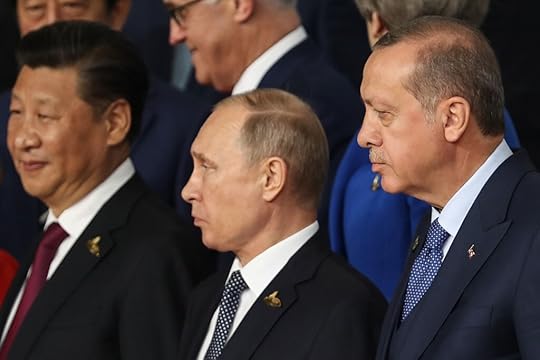
From a Google Image Search – Politico
Let’s see what Anne Applebaum means when she compares the spread of autocracy and kleptocracy to the spread of a cancer. As Western nations try to influence nations that intimidate or use violence against their citizens – nations that give power to a few and squelch the human rights of many – by sanctioning them or their banks or institutions, autocratic leaders are creeping in to bypass these sanctions or boycotts. In a way Autocracy, Inc., if it existed as a formal global entity, would be an anti-NATO. These nations seek to undermine democracies and, if they succeed, they create new autocracies. The pilfering of national dollars can cause the nations they “protect” to fail without their assistance (sometimes even with their assistance). The lure of fortunes to be made and sequestered away is creating a pull towards autocracy in nations that are long-established democracies. This has us fearing that the balance of global power is shifting towards autocratic/kleptocratic governance and may give global hegemony to a giant autocracy like China, or a giant, ruthless autocracy like Russia. The 2024 election in America could weaken our democracy, perhaps beyond restoration, if Trump and the Republicans win.
Applebaum uses several examples to illustrate how Autocracy Inc., through mostly unplanned interventions, allows dysfunctional, pillaged national economies to continue to serve as fodder for kleptocrats. These rescuer nations may have once required no quid pro quos, but they have learned to profit as they preserve autocracies in trouble.
This article will summarize her discussion of this dynamic with one example in Venezuela, but there are more examples in Applebaum’s book. President Hugo Chavez rose to power in 1998. Venezuela was an oil state, “nepotistic and corrupt.” Politicians were bribed and deals were offered to friends of the former President. Chavez ran as a leader “who promised to create a more honest “Bavarian Republic of Venezuela”. But as corruption crept in Chavez did not pursue opportunities to end it, in fact he fired the whistleblower, a member of his inner circle. Chavez, like Putin, chose to turn Venezuela into a kleptocracy. “Corrupt officials prove more malleable than clean ones.” (p. 45)
Chavez eliminated transparency and accountability, he broke democratic institutions like the press, the courts, the civil service. (Sound familiar?) All the while he kept proclaiming his belief in democracy. Applebaum says, “since everyone was breaking the law no one wanted to talk about it.” Meanwhile, officials were hiding millions in oil money in a Portuguese Bank (Banco Espirito Santo). Ten billion dollars went into Swiss banks and 26 billion from a Venezuelan oil company scam was stashed in Andora Banks. A later investigation showed 127 cases of large-scale corruption just in the oil industry. (pg. 46)
A new form of corruption later named currency exchange manipulation offered a way to profit from skimming dollars and exploiting weak laws. For a while students figured out how to game the currency exchange system. It was called the “democratization of kleptocracy” Chavez was able to fool many for a while until the decline of the oil industry began in 2002-3.
“Billions (or maybe tens of billions) of state funds had vanished, the country’s foreign currency had disappeared into private offshore accounts, hyperinflation accelerated and imported goods vanished.” (p. 48-49)
Chavez died in 2013, and Venezuelans hoped the corruption would end when they elected Nicolás Maduro, but, Applebaum contends, “Autocracy Inc. stepped in to help.” Rogue states surviving under sanctions turned to new sources of funding. They turned to drug trafficking, illegal mining, extortion, kidnapping, and gasoline smuggling. She argues, “[i]f a state is a member of Autocracy Inc. there are other options.” (p. 50) There are friends and trading partners in other sanctioned states. There are companies that are unbothered by corruption – happy to encourage it and to participate in it.
Russian companies stepped in to replace North America, South America, and Europe. Rosneft, Gazprom, Lukoil, TNK-BP all put money into Venezuela. Grain imports from the US and Canada were replaced by Russia along with 4 billion in Russian weapons.
China started loaning money to Venezuela without conditions which bought Chavez and Maduro time before collapse. China eventually added conditions when Venezuela defaulted on the loans. China sold riot gear to the regimes.
Cuba was linked to Venezuela by an anti-American agenda. Oil moved from Venezuela to Cuba; soldiers, police officers, and security and intelligence experts moved from Cuba to Venezuela (to quell riots and demonstrations). Cuba taught Venezuela how to use food shortages to end dissent (think about it).
Turkey helped because of personal links between Erdogan and Maduro who were bonded by their dislike of democracy and its anti-corruption movements. Venezuela sent gold to Turkey in exchange for food.
Iran seemed the most improbable tie, Applebaum tells us. Oil binds them and anti-Americanism, opposition of democratic movements at home, trading information about how to evade sanctions. Iran got gold, Venezuela got food, gasoline and advice on the repression of dissidents. Iran helped Venezuela build a drone factory and sent money to be laundered for Hezbollah.
There are more examples in Chapter 2. More nations are involved. Applebaum says, “there are hybrid states that are a legitimate part of international financial systems, that normally trade with the democratic world, that are sometimes part of democratic military alliances but are also willing to launder or accept criminal or stolen wealth or to assist people and companies that have been sanctioned.” (p. 50)
My comments – Perhaps you have been very aware of the spread of autocracy and are not surprised by corruption, but it is important to note how autocratic nations are pitching in to get around sanctions that democracies use to try to enforce humanitarian standards both in peace and war. Will Autocracy Inc. become an institutionalized force against democracy instead of providing hit and run assistance to kleptocracies that go too far, whose economies fail, and who have sanctions against them? These nations deliberately try to exert power to prevent humanitarian reforms in the nations that may soon make up a true Autocracy Inc.
Autocracy, Inc. by Anne Applebaum, Chapter 1

From a Google Image Search – The Guardian
Autocracy, Inc. by Anne Applebaum
There are reasons why Anne Applebaum’s book Autocracy, Inc. is directly related to the 2024 election. Voters should always have access to issues that will affect their future as Americans. Sometimes there are issues that are flying under the radar, not being given the weight they should bear in our decision-making. Applebaum offers the details that show the roots of our autocratic tendencies. She ties togethers what seems like an economic wet dream with a flirtatious ideological invitation to keep the money train moving by voting. If Americans give Trump autocratic powers, he will guarantee that wealthy people will have pathways to stay wealthy (cutting taxes, cutting government, tariffs, favoritism). Those who support Trump in every way will be allowed to accumulate fortunes, as has been true for the oligarchs in autocratic states. Applebaum is asking us if we really want to give up our democracy so that rich people can turn the American economy into the Cayman Islands and the American government into Hungary (or Russia)? So, I am offering my version of Cliff Notes on Autocracy, Inc.
Anne Applebaum’s book Autocracy, Inc. is dense with statements of fact and proofs for those facts. Attempting to summarize and condense the contents is difficult. The ideas I am offering are not my own ideas. These are the arguments Anne Applebaum makes in her deceptively petite book. However, I do agree with her ideas and the details provided in her proofs make her commentary important. So, some of my summary will paraphrase the author and some will quote her directly. The contents of this book give us explanations for the rise of autocracies and show how America (and Great Britain) have become enmeshed in these kleptocratic practices. Applebaum is showing us our own drift towards autocracy and kleptocracy. Will abandoning human rights work to bring economic equality to all or to just a very few oligarchs? It’s an easy question to answer, but being able to get “down in the weeds” with cogent examples is the gift Anne Applebaum offers us. She has a team helping her with her research summarizing the content of many sources. She then passes what she has learned on to us.
How did America begin to adopt the practices of autocracies and kleptocracies?“Western political leaders spoke about “democracy” and the “rule of law” in Russia, but Western companies were building autocracies and lawlessness and not only in Russia…By the time Putin became president, he was well acquainted with the double standards of Western democracies, which preached liberal values at home but were very happy to help build illiberal regimes everywhere else.” (p. 33)
Did we reap what we sowed?Applebaum would say “yes,” I think. Her example takes us to Russia. Russia under Putin was designed to look like a democracy but look closer she suggests.
1. there were “no accidental winners” in Russian elections
2. everything was a front
3. banks that looked like banks were often money-laundering operations
4. “companies were sometimes facades” – what they offered were “ways for the very wealthy to siphon assets away from the state”
Many inhabitants of the Western world profited, ostensibly believing that Putin intended to democratize Russia.
Example: A steel plant in Warren, Ohio with a history of two explosions and many safety violations was shut down for good in January 2016. Kolomoisky (a Ukrainian oligarch from when the government followed the Russian model) owned the mill and hundreds of millions of dollars’ worth of midwestern properties (“as part of a money-laundering operation connected to defrauding PrivatBank – a retail bank in Ukraine”).
“For decades, American real estate agents were not required to examine the source of their client’s funding.” It was okay to buy property anonymously (both in the US and in Europe). (p. 37)
Kolomoisky’s money from PrivatBank flowed through shell companies in Cyprus, the British Virgin Islands, and an American Branch of Deutsche Bank in Delaware.
Applebaum names some names:
Two Americans bought properties for Kolomoisky. Chaim Schochet of Miami and Mordechai Korf, a Miami businessman. Marc Kasowitz (who also represents Donald Trump) was their lawyer.
“These arrangements make no sense as business decisions,” says Applebaum, “but make plenty of sense in the arcane world of international kleptocracy.”
“In such a system, theft is rewarded, taxes are not paid, law enforcement is impotent and underfunded, and regulation is to be dodged,” she reminds us.
What we have learned.Remember the revelations in the Pandora Papers (October 2021) from the International Consortium of Investigative Journalists.
(Paraphrased) We have learned that financial traffic does not just go through the Caribbean — it also goes through the US and Great Britain. In the US, Delaware, Nevada, South Dakota and Wyoming are open for secretive financial operations.
Applebaum’s Conclusions in Chapter 1“To stay in power, modern autocrats need to be able to take money and hide it without being bothered by political institutions that encourage transparency, accountability, or public debate.”
“Kleptocracy and autocracy go hand in hand, reinforcing each other but also undermining any other institution they touch. the real estate agents who don’t ask too many questions in Sussex or Hampshire, the factory owners eager to unload failing businesses in Warren, the bankers in Sioux Falls happy to accept mystery deposits from mystery clients — all of them undermine the rule of law in their own countries and around the world. The globalization of finance, the plethora of hiding places, and the benign tolerance that democracies have shown for foreign graft now give autocrats opportunities that few could have imagined a couple of decades ago. (p. 42)
September 2, 2024
Autocracy, Inc. by Anne Applebaum-Book
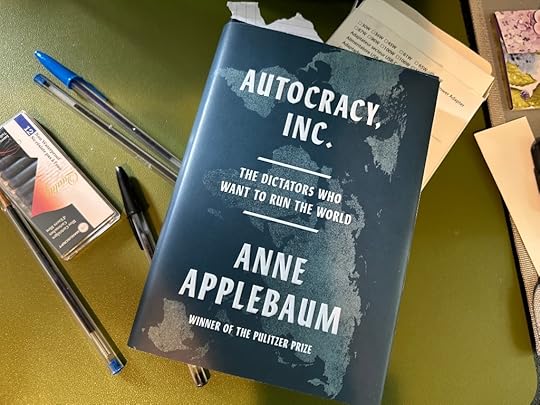
Personal Photo
Autocracy, Inc. by Anne Applebaum – Book
Anne Applebaum is a reporter, an expert on Eastern Europe, Russia, China, Arabic nations and African nations. She is a Pulitzer Prize winner. Her newest book, Autocracy, Inc: The Dictators Who Want to Run the World, looks small but it’s an important manual describing the wheeling and dealing of autocrats both at home and abroad. This is a book that should be in your library if you believe that democracy, freedom, and human rights are worth fighting for. If you don’t think that there is a fight, read this book and it just might make you a believer. If you want to hear about strategies that could work in this fight they are on offer. It’s a war unlike the old Cold War we are familiar with. The dynamics are complex and the strategies change. Summarizing this book won’t work as it is a handbook and every word seems to carry weight. It is full of anecdotes that make concepts easy to understand and add value to the author’s arguments.
In the Introduction, Applebaum argues that it is greed that binds these autocrats, that their kleptocracy is metastasizing, that autocrats have learned how to control the narrative and change up the operating system (with a boost from tech advances) and that part of their plan involves smearing the Democrats. Action strategies are discussed in the Epilogue entitled Democrats United.
“Nowadays, autocracies are run not by one bad guy, but by sophisticated networks relying on kleptocratic financial structures, a complex of security systems-military, paramilitary, police-and technological experts who provide surveillance, propaganda, and disinformation.” (p. 1)
Members of Autocracy, Inc are connected within a given autocracy, but also with leaders in other autocratic countries, and sometimes with politicians in democracies too. These nations have different historical roots, goals and aesthetics, Applebaum tells us and then lists the nations:
China-Communism
Russia-Nationalism
Venezuela-Bolivarian socialism
North Korea-Juche
Islamic Republic of Iran-Shia radicalism
Monarchies: not as likely to seek to undermine the democratic world
Saudi Arabia
The Emirates
Vietnam
Softer autocracies (illiberal democracies)-choose allies based on expediency
Turkey
Singapore
India
Phillippines
Hungary
Other autocracies:
Nicaragua
Angola
Myanmar
Cuba
Syria
Zimbabwe
Belarus
Sudan
Azerbaijan
and 3 dozen others that are not named in the introduction.
Applebaum tells us that these nations do not act like a “bloc” but rather like “an agglomeration of companies bound not by ideology but rather a ruthless single-minded determination to preserve wealth and power). (which Applebaum and others call Autocracy, Inc.) (p. 4)
“They share a determination to deprive their citizens of any real influence or public voice, to push back against all forms of transparency or accountability, and to repress anyone, at home or abroad, who challenges them. (p. 3)
She tells us that their bonds are “cemented not through ideals, but through deals.” (p. 3)
Autocracy, Inc. nations collaborate to keep members in power and create a new world order (to replace the liberal world order). (p. 17)
“The autocracies believe they are winning. That belief-where it came from, why it persists, how the democratic world originally helped consolidate it, and how we can defeat it-is the subject of this book.) (p. 17)
It’s difficult to write about Applebaum’s book in my own words because she has done her due diligence, she is the expert we all need to consult, and every point she makes resonates if you have been watching and feeling anxious about the spread of autocracy. The book is full of anecdotes that we will recognize from news feeds although, perhaps, we were not able to put them into an organized framework to explain how powerful these concerted and often selfish efforts have been in creating changes in the world. If we don’t want to give up on the ideals of freedom of speech and freedom of thought and transparency; all the democratic principles we admire, then we will need better strategies to fight nations that do not mind fighting dirty. Demonstrations are not the best option. Applebaum explains why.
If you are an activist this is an important book to read and study. If you think governments are too corrupt and that you will ignore politics and live your life, you also need to read and study this book. Autocracy, Inc. is counting on ambivalence as an important weapon in this war on democracy.
August 29, 2024
This Strange Eventful History by Claire Messud – Book

From a Google Image Search – NPR
Claire Messud’s book This Strange Eventful History tells the fictionalized life of her extended family. Not quite a memoir, it resembles an Ancestry test result, fleshed out with familial and historical details, that resurrects the essences of a family’s life. Gaston and Lucienne live in Algeria, a colony of France which promises residents that they are French citizens, equal in every way to Frenchmen. As the Nazi’s are beginning their occupation of France, Gaston, a civil servant climbing the ranks, thinks about volunteering for the French navy. He ends up going to Beirut where his bosses direct him, which is not into the French navy. His family, living in France at the time, leaves France to return to Algeria. There are two young children in the fleeing family of Gaston and Lucienne; François and Denise. When the war ends, the Cassar family is still living in Algeria. Messud describes Gaston’s decision and his relationship with his wife in her elegant prose:
“Back and forth, Gaston had argued all possible permutations in his head in the forty-eight hours since hearing the broadcast. He’d considered the choice before him while walking, while packing, while lunching with Cotigny, though he didn’t speak of it to his adjunct. He wished above all that he could speak to Lucienne; in the night he spoke aloud to her untouched pillow, as if she lay beside him, though it smelled only of laundering. How could he know what to do without knowing her mind? He thought of them as joined by an invisible thread, always united, one heart in two bodies. The two halves of Plato’s Symposium, who had found each other and their life’s purpose.” (p. 58)
In possession of her grandfather’s notes (all 1000 pages), Messud offers us views of a man’s life and his inner thoughts as he moves from the public sector back to the private sector and becomes as successful as he will become. Then we follow his son François to school in America and to his life with his wife, Barbara. Denise’s life is portrayed just as believably. The Cassar family expands as family members age and have children.
Messud describes a time after WWII when Algeria wins its independence from France and the family has to leave the country they know best to return to France. Many countries gave or were forced to give independence to their colonies in the twentieth century. Gaston’s upheaval was experienced by plenty of others and led us all to many discussions about the colonizing motivations of our forebears. Despite our negative judgements, if we go to space, I think we will be colonizers once again.
Although this book may be considered too literary for some readers, Messud creates for us the various places where these characters reside and immerses us in lives that we can comprehend but which are most likely dissimilar to our own lives. It reminded me of the biography of Winston Churchill, although without the degree of historical significance of Churchill. Walking with Destiny by Andrew Roberts shows us Churchill living through some of the same historical eras as the Cassars, and similarly takes us to geographic locations we may never have visited with much discussion of Britain’s colonies.
Now I will apologize in advance for expressing maudlin thoughts, but I am at an age where my demise could be imminent. Messud not only covers the lives of these family members; she also covers their deaths. She doesn’t dwell on biological details, just on the way a full life dwindles and becomes circumscribed as we age, or if we have a fatal illness. We die alone, she does not pull her punches about this, but our deaths do affect those who love us. The details of the care we receive as life leaves us (or we leave it) may not resemble those enjoyed by the Cassar’s who lived in different times and who did not have to worry about financial matters, but still Messud has us contemplating the possible details of our own dying moments. I appreciated time spent with Claire Messud’s family, fictionalized or real. Good stuff. In fact, Messud’s book is shortlisted for the Booker Prize, 2024.
August 4, 2024
The Husbands by Holly Gramazio – Book

From a Google Image Search – Holly Gramazio’s author website
Lauren, Lauren, Lauren. OMG. Or should I say Holly, Holly, Holly because Holly Gramazio wrote the very bizarre book, The Husbands. Her book is unique, a real trip to modern culture, to reality – to somewhere. Lauren and her sister Nat own a pair of flats in London. Lauren lives in one and her sister, mother of Magda lives elsewhere. When the bulb in Lauren’s attic is replaced, it triggers some kind of electric wormhole in the universe or an anomaly in the space-time continuum. From that time on Lauren’s attic seems to offer her an endless supply of husbands.
Lauren is single, but one day when she comes home from work and finds a guy in her flat who says he is her husband, Michael. Lauren plays along. She even finds pictures of their wedding in her phone. Her apartment is painted in different colors. There are other changes – furniture and layout. One day she sends Michael into the attic, and he disappears. But a new husband climbs down. Who remembers husband’s names? We are simply fascinated as Lauren temporarily lives with each new husband or sends him immediately back to the attic. While it’s interesting to meet some of the 200 plus husbands Lauren meets and discards, it becomes somewhat repetitive and then unnerving. How many examples does one need to learn a life lesson? Is there such a thing as a perfect husband?
Lauren gets attached to a couple of these guys. She falls for Carter, but he does not fall for her. She learns, eventually, that these are real guys who exist in her world. She sees what happens in some of their lives after she discards them. Lauren decides to fly to Denver, Colorado when she learns that Carter lives there. She also meets someone (the name is unusual so it’s hard to grasp it on Audible – perhaps Vorhees) who is experiencing the same anomaly, only with wives. They correspond.
The great thing about discarding husbands (not always great) is that her financial circumstances, her jobs, her decor all change with each new husband. Sometimes these circumstantial changes help her decide whether a husband should be instantly discarded or kept around for a while. One really useful change is that debts disappear with each new adventure in husbands.
The book is too long. There are a few too many husbands. But it is entertaining and in the end there is a point, which I will leave it for you to figure out. If someone tells you there is nothing new under the sun, Holly Gramazio will make you rethink.
July 22, 2024
The Fifth Risk: Undoing Democracy by Michael Lewis-Book
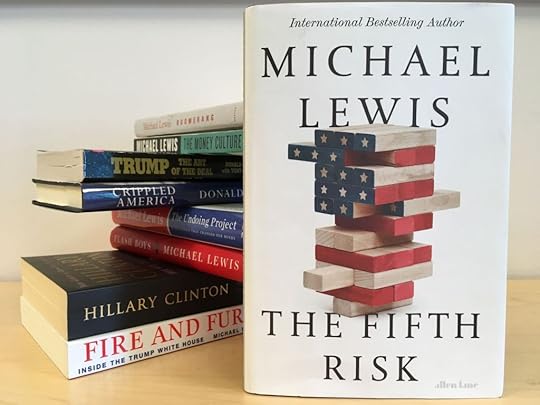
From a Google image Search – Facts.net
Michael Lewis’ book The Fifth Risk is nonfiction. It examines what happened in several government agencies when Trump won the 2016 election. Presidents usually put their own people in as heads of our government agencies, and they tend to do it quickly and strategically. A team is generally sent in to make a smooth transition in services that benefit key groups which in turn benefit American citizens.
When Trump took office several department/agencies saw no transition team arrive and if a new head of agency had been appointed, they tended to arrive alone and late and to ignore the transition materials prepared by outgoing staff.
By now Americans have heard plenty about the Heritage Foundation’s agenda for the RNC if Trump wins in 2024 in the nearly 1000-page Project 2025 pdf. Lewis in his book The Fifth Risk takes a deep dive on a few areas where Republicans already showed us what changes they plan to make in programs that Americans rely on, programs that Republicans want to shut down. Trump, in his first term as President, tended to replace career people who were experts in their fields with loyalists who planned to deconstruct the departments they led.
One of these departments was the Department of Energy. Trump and Republicans are climate deniers. They do not want to implement alternative energies; they would rather rely even more heavily on fossil fuels. Employees in the Department of Energy expected people to be sent by the new administration to the department for the transition. They had all the transition notebooks ready to bring the new staff up to date on things like how to stop a virus, how to take a census, how to tell if a foreign nation has nuclear capability. No one showed. A man named Pyle finally showed up but would not listen to experts in the department. He suggested weekly meetings but never attended them. He sent a list of 24 questions which asked for lists of attendees to energy meetings. All DOE scientific experts were told to leave despite the need for national nuclear security.
Chapter II tells the story of Ali Zaidis whose parents moved him from Karachi to a small American town with no Muslims. Ali became a Republican until he traveled with the America’s Promise Board to help in New Orleans after Katrina. He was shocked by the poverty he saw. He asked himself how anyone could “lift themselves up by their own bootstraps” when there were no bootstraps. This question also came up – “If you’re a store owner after a weather crisis, should you hike up the cost of flashlights.” Members of the Republican Club said yes. Ali said no. So, Ali joined the Obama campaign and took a job at the White House. He was using data from the Department of Agriculture. It was a month before anyone showed up in 2016 from the Trump administration. The appointee was a hunter and gun enthusiast. He wanted a list of employees who worked on climate change. The Trump administration sent in employees with little or no agriculture experience and everyone was instructed not to say “climate change”. Sonny Purdue finally arrived in April.
The USDA had a particularly complicated budget. They oversaw food services and school lunch programs and WIC. Trump cut food stamps over 25%. People are convinced that food stamp recipients buy things that are not acceptable and sell their food stamps for cash. Since the EBT cards were put into use cheating was rare. Hungry people are not always fed. The states get the money, but they don’t have to use it to feed people. “We are proud to do the absolute minimum,” said one state leader. I haven’t told you all the sad anecdotes. It’s the Department of Agriculture after all and we haven’t even talked about farms yet. Changes in ag-science drive changes in society.
The third department discussed by Lewis is the department that keeps track of the weather. Before the technology developed and computers were able to handle complex data, there was very little data available about the weather. After a deadly hurricane hit Joplin, Missouri it was noted that tornado warnings often came too late. We have seen the improvement in weather data since early days. When the Trump team came in to the agency employees were not allowed to say the word “tornado”, because I guess if you don’t say it then it won’t happen? (Ridiculous) Since the arrival of weather channels like AccuWeather people tend to think that their weather reports come from private endeavors, and they don’t realize the role of government and science in supporting the collection of weather data. Republicans want to stop sending out weather data for free and to sell it to private enterprises that will then sell it to us.
Although this book is about the first Trump administration the author warns us of what might happen in a second Trump term. Michael Lewis covers information that many citizens don’t have access to in his book The Fifth Risk. Be informed.
July 9, 2024
All the Sinners Bleed by S. A. Cosby – Book
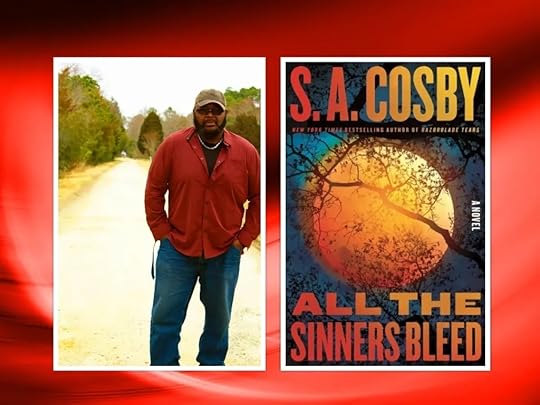
From a Google Image Search – LitStack
Listening to All the Sinners Bleed by S. A. Cosby comes with the bonus of the reader’s accents, all Southern dialects that vary according to which character is speaking. The accents all share similarities since one reader is speaking but it works and adds flavor to the story. I am listening to books again temporarily because I saved up credits from before my cataract surgery when I couldn’t read print books easily. After briefly subscribing to Audible + I ended up with 6 credits to spend – a dream scenario for a reader.
Charon County (Virginia) has been associated for decades with dark deeds and evil events, perhaps a negative karmic gift that resulted from the mythical reference it was saddled with, and because it was founded in bloodshed against indigenous people, “sown with generations of tears.” “The South doesn’t change” says the author.
Titus is, by some miracle, the first black sheriff of Charon County. Dressing for his day is described with ritualistic echoes of warriors preparing for battle. It’s a good thing Titus is prepared because this is no ordinary day in Charon County. Just as he finishes dressing with his bulletproof vest underneath and his gun belt strapped to his waist, his radio squawks and the news is that there is a school shooting in progress at the high school.
Although mass shootings are right out of the headlines of the moment, it turns out that only one person has been killed. This was a targeted hit. The shooter is a local guy, Latrell (hard to get spelling right from listening to a book). He has killed a very popular teacher of 9th grade geography who has a reputation for going out of his way to help needy students, Mr. Spearman. Why? Titus had hoped to find out by questioning Latrell, but Latrell committed suicide.
What follows is an investigation that uncovers some grisly, hateful, and secretive actions that will weigh heavily on this town for many years to come. These activities do not speak kindly of the darkest bits of human nature, but the author addresses legitimate concerns about real world events. However, this is a mystery novel and not a book that attempts to sort out the human dilemma.
While not for the squeamish, readers will read on to find out the identity of a man who wears a wolf mask to commit heinous acts that act out his deep psychological pain. Titus, an ex-FBI agent, has a warm relationship with his father Albert and his brother Marquis. He has a current girlfriend (Darlene) and an ex-girlfriend (Kelly). These are the core characters showing us a sheriff who is well-adjusted, dedicated to justice, and a bit clueless when it comes to women. Good characters make good books better. If you like mysteries this one is well worth reading.



